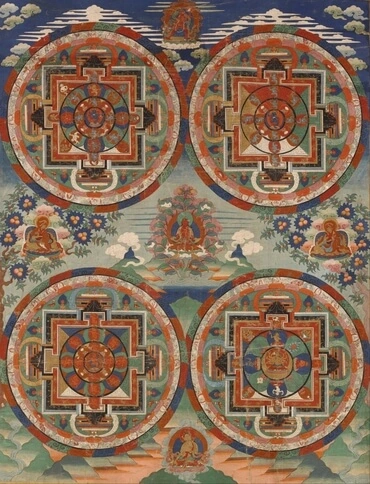1
`Thus said the Lord Jehovah: The gate of the inner court that is looking eastward is shut the six days of work, and on the day of rest it is opened, and in the day of the new moon it is opened;
2
and come in hath the prince the way of the porch of the gate at the outside, and he hath stood by the post of the gate, and the priests have made his burnt-offering, and his peace-offerings, and he hath bowed himself by the opening of the gate, and hath gone forth, and the gate is not shut till the evening.
3
And bowed themselves have the people of the land at the opening of that gate, on sabbaths, and on new moons, before Jehovah.
4
`And the burnt-offering that the prince bringeth near to Jehovah on the day of rest [is] six lambs, perfect ones, and a ram, a perfect one.
5
And the present [is] an ephah for a ram, and for the lambs a present, the gift of his hand, and of oil a hin for an ephah.
6
And on the day of the new moon a bullock, a son of the herd, a perfect one, and six lambs and a ram, they are perfect.
7
And with an ephah for a bullock, and an ephah for a ram, he prepareth a present, and for the lambs as his hand attaineth, and of oil a hin for an ephah.
8
`And in the coming in of the prince, the way of the porch of the gate he cometh in, and by its way he goeth out.
9
And in the coming in of the people of the land before Jehovah at appointed times, he who hath come in the way of the north gate to bow himself, goeth out the way of the south gate, and he who hath come in the way of the south gate, goeth out by the way of the north gate: he doth not turn back the way of the gate by which he came in, but over-against it he goeth out.
10
And the prince in their midst in their coming in cometh in, and in their going out he goeth out.
11
`And in feasts, and in appointed times, the present is an ephah for a bullock, and an ephah for a ram, and for lambs the gift of his hand, and of oil a hin for an ephah.
12
And when the prince maketh a free-will burnt-offering, or free-will peace-offerings, to Jehovah, then he hath opened for himself the gate that is looking eastward, and he hath made his burnt-offering and his peace-offerings as he doth in the day of rest, and he hath gone out, and he hath shut the gate after his going out.
13
`And a lamb, son of a year, a perfect one, thou dost make a burnt-offering daily to Jehovah; morning by morning thou dost make it.
14
And a present thou dost make for it morning by morning, a sixth part of the ephah, and of oil a third part of the hin, to temper with the fine flour, a present to Jehovah, by a statute age-during -- continually;
15
and prepare ye the lamb, and the present, and the oil, morning by morning, a continual burnt-offering.
16
`Thus said the Lord Jehovah: When the prince giveth a gift to any of his sons, his inheritance it [is], to his sons it [is]; their possession it [is] by inheritance.
17
And when he giveth a gift out of his inheritance to one of his servants, then it hath been to him till the year of freedom, and it hath turned back to the prince, only the inheritance of his sons is theirs.
18
And the prince doth not take of the inheritance of the people to oppress them, out of their possession, out of his own possession he doth cause his sons to inherit, so that My people are not scattered each from his possession.'
19
And he bringeth me in through the entrance that [is] by the side of the gate, unto the holy chambers, unto the priests, that are looking northward, and lo, there [is] a place in their two sides westward.
20
And he saith unto me, `This [is] the place where the priests do boil the guilt-offering and the sin-offering, where they bake the present, so as not to bring [it] out unto the outer court, to sanctify the people.'
21
And he bringeth me out unto the outer court, and causeth me to pass over unto the four corners of the court, and lo, a court in a corner of the court, a court in a corner of the corner.
22
In the four corners of the court [are] perfume courts, forty long, and thirty broad, one measure [is] to the four corners.
23
And a row [is] round about in them, round about to them four, and made with boilers under the rows round about.
24
And he saith unto me, `These [are] the houses of those boiling where the ministrants of the house boil the sacrifice of the people.'







